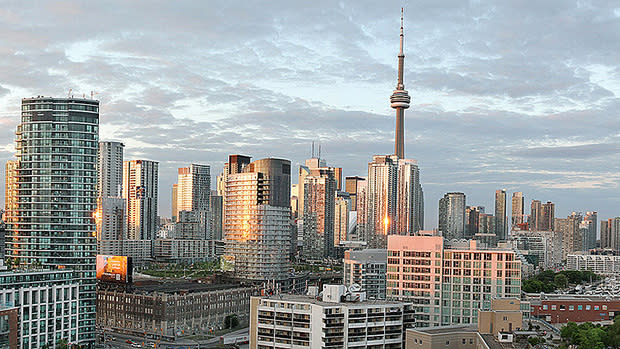Toronto, Vancouver rental-market demand wavers: CIBC

Renters could begin to see some price relief now that demand for units has peaked in Canada, a new report suggests.
CIBC says demand for rental units across Canada hit a high point in 2012 and is now starting to slowly drop off thanks to a condo building boom and a demographic shift.
Cities such as Vancouver and Toronto, which make up 45 per cent of the national rental market, will see a small uptick in vacancy rates, CIBC predicts.
While that is good news for renters worried about an escalating cost of living (including those saving to one day buy their own home), it doesn't necessarily mean a huge loss for landlords, says CIBC deputy chief economist Benjamin Tal.
"Vacancy rates will probably rise in the coming few years and rent inflation will ease. But a careful analysis of the magnitude of the projected supply/demand mismatch suggests a much gentler adjustment than feared by many," Tal writes.
Fears that rental units would flood the market and create a wave of sales by "disappointed investors with no bargaining power," are unlikely to be realized, Tal says.
What's more, he notes bears predicting the crash in Canada's housing market have so far been disappointed as the market continues to defy expectations.
"The market will eventually be tested by higher interest rates. But as things stand now, those bears will have to continue to wait as interest rates are likely to remain low well into 2015," Tal says.
The cross-Canada picture
In a cross-country assessment of the rental market, Tal says 18 of the 26 largest cities have what he calls a “soft” rental market, with vacancy rates of 2.5 per cent or higher. That includes cities such as Winnipeg, Montreal, Victoria and Saint John, to name a few.
The “tight” markets are Calgary and Edmonton, where the vacancy rates are 1 and 1.4 per cent, respectively.
More “balanced” markets (with vacancy rates between 1.5 and 2.5 per cent) include Toronto, Vancouver, Regina, Oshawa, Kingston and Quebec City.
In the coming years, Tal says a demographic shift and smaller average rental households (2.1 occupants in 2013, down from 2.4 a decade earlier) will lead to a “moderately downward trajectory,” after the market reached its peak in 2012.
“If your benchmark is 2012 or even 2013, then you should expect lower demand in the coming years,” he writes.
Tal estimates demand growth for rental units peaked in 2012 in Toronto and last year in Vancouver.
Thanks to steady condo construction in recent years, he’s predicting excess supply of units that will lead to a small uptick in vacancy rates in both markets of about 0.3 to 0.4 per cent.
“That is not large enough a damage to derail the market or lead to a substantial softening in rent inflation,” Tal says.
“So the real challenge for investors down the road won’t be falling rents, but rather, higher financing or opportunity costs when mortgage rates eventually rise.”

 Yahoo Finance
Yahoo Finance 
